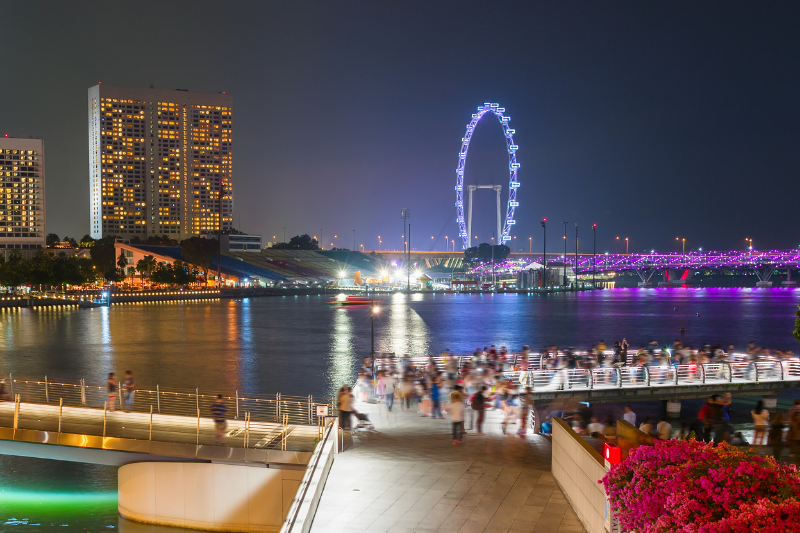Can Vaccinated Travel Lanes Spark a Revival in Tourism Stocks?

Tourism is an integral part of Singapore’s economy.
However, the prolonged border closures that have crimped tourist flow into the island.
The government, however, is working hard on initiatives to ensure aeroplanes can fly again.
Progress has been met with twists and turns.
Last month, the Hong Kong travel bubble was scrapped. However, in its place, a new scheme known as vaccinated travel lanes (VTL) was launched immediately after.
Travellers from Germany and Brunei need not serve a stay-home notice but will need to undergo multiple COVID-19 tests while in Singapore.
Just last week, the first two designated VTL flights from Germany arrived in Singapore, with the first carrying around 100 passengers.
The success of the VTL is like a breath of fresh air for the beleaguered airline and tourism industry.
Could the VTL help to spark a revival in interest in tourism stocks?
Limited destinations
First, let’s take a closer look at the VTL scheme.
The scheme includes additional processes and cost for travellers andis only has two destinations in its pilot scheme.
Investors may argue that it is still early days and that the scheme will eventually be extended to other countries with high vaccination rates.
As it stands, the limited number of countries means that it may take a while before companies such as Genting Singapore Limited (SGX: G13) and Straco Corporation Limited (SGX: S85) see an uptick in visitors.
For context, during the fourth quarter of 2019 (4Q2019), tourism receipts hit S$7.1 billion while international visitors reached 4.8 million.
But for the first quarter of 2021, tourism receipts shrank to just S$0.4 million while international visitors shrivelled to 69,000.
It’s also important to note that of the 100 travellers on the first flight from Germany, only 57 were short-term visitors, implying that not all of them were tourists.
Meanwhile, based on the 4Q2019 government report, the bulk of Singapore’s tourism receipts came from three countries — China, Indonesia and India, taking up 16.4%, 14.7% and 7.3% of the total pie, respectively.
If these three countries are not included in either the VTL or Air Travel Pass scheme, it’s tough to see the number of tourists increase by a meaningful amount.
Risk of breakthrough infections
The COVID-19 virus has proved to be a tricky virus to contain.
Even with high vaccination rates, the infectious nature of the delta variant still keeps the number of people infected at high absolute figures.
These are known as “breakthrough” infections as the virus has “broken through” the antibody defences.
There is also a concern that vaccinated people may still be prone to severe illness, especially among older folk or those with pre-existing conditions.
Singapore intends to move into a new phase called the “endemic” phase where everyone can live with the virus but where the severity of illness is kept under control.
Visitors who come to Singapore are thus exposed to the risk of breakthrough infections, which may scuttle their travel plans.
If more of such infections are made public, it may crimp demand for the VTL and keep more visitors from coming over.
A reduction in business trips
Another dampener for the tourism and travel industries is that many companies are rethinking corporate travel and downsizing their budgets.
US spending on corporate travel is expected to reach just 25% to 35% of 2019 levels by the fourth quarter of 2021 and will rise to 65% to 80% by 2022, according to a survey by audit firm Deloitte and Touche of 150 travel managers.
It’s not just about cutting costs, but executives are also tired of corporate travel along with the inevitable jetlag.
Coupled with new, onerous requirements for travel in the era of COVID-19, and companies have the perfect reason to ask executives to stay put and use remote means to tie up deals or inspect factories.
Business travellers spend on accommodation, food and beverage and, to some extent, also shop for goods in countries that they visit.
These three components made up more than a third of tourism receipts for 4Q2019, and with the reduction in this segment, tourism companies will find it an uphill task to recover the lost revenue.
Get Smart: Still a tough slog
VTLs are a welcome relief for airlines, hotels and tourism companies.
However, the coast is not clear yet for these sectors as the future reopening of borders still remains uncertain.
Visitor numbers may inch up slightly with VTLs and other schemes, but investors should not be too quick to jump on the tourism business bandwagon just yet.
If you want more stock ideas, start looking out for these 5 unique traits in the stock market. Companies with these traits can possibly pay you dividends for life. Discover what these traits are in your FREE special report “Dividend Stocks That Can Pay You For Life”. Click here to download now.
Follow us on Facebook and Telegram for the latest investing news and analyses!
Disclaimer: Royston Yang does not own shares in any of the companies mentioned.
The post Can Vaccinated Travel Lanes Spark a Revival in Tourism Stocks? appeared first on The Smart Investor.

 Yahoo Finance
Yahoo Finance 